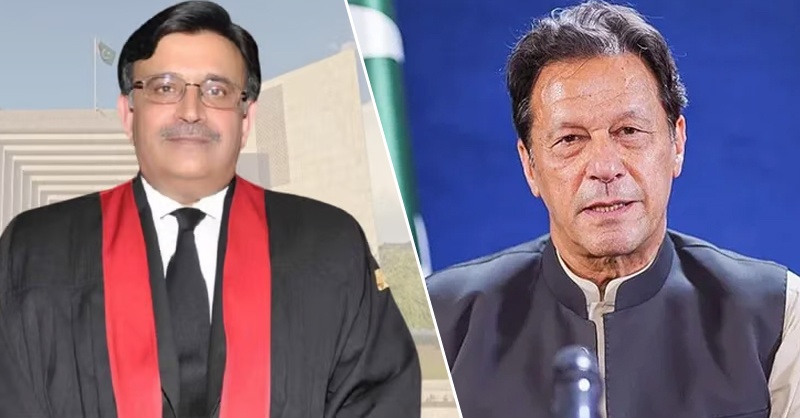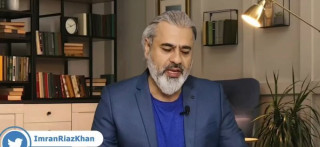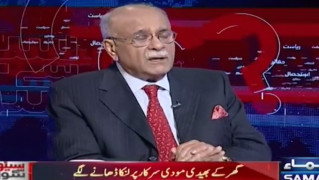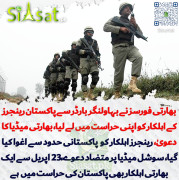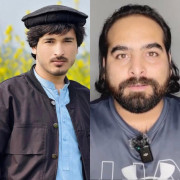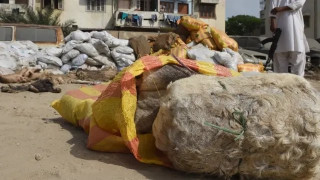The ousted Pakistani leader and his party face dozens of charges he says are politicized—but he hasn’t been arrested yet.
In a high-tension standoff last month, police arrived at the home of former Pakistani Prime Minister Imran Khan in Lahore, Pakistan, to arrest him after he failed to show up to hearings for an ongoing corruption case. Khan blamed security concerns for his failure to appear—he survived an assassination attempt last November—and avoided arrest by vowing to come into court days later. But the police raid at his home sparked protests across the country as his passionate supporters took to the streets to defend their leader.
Khan was ousted as prime minister in April 2022 through a parliamentary no-confidence vote and has since rallied mass support and pushed for snap elections. He and other members and supporters of his party, Pakistan Tehreek-e-Insaf (PTI), now stand accused of as many as 140 crimes, according to the party’s lawyer. (Court documents provided to Foreign Policy by PTI show 130 cases involving PTI leaders, party workers, and a welfare trust that Pakistan’s Federal Investigation Agency alleges PTI used for prohibited campaign funding.) The cases against Khan himself—34, according to the documents—range from contempt of court to terrorism. These charges are the latest chapter in an epic battle between the cricket star-turned-politician and Pakistan’s current government, which is backed by the country’s powerful military, as Khan once was.
As cases against Khan make their way through the courts, Pakistan’s judiciary finds itself in the difficult position of arbitrating heated political matters. What happens next could provide insight into how much judges are influenced by both the military establishment and Khan’s political messaging. On Tuesday, Pakistan’s top court ruled against a recent decision by Pakistan’s Election Commission to delay provincial elections in two provinces formerly controlled by PTI until October. The court found the previous decision unconstitutional and ordered that elections in the province of Punjab be held by May 14—marking a win for Khan and his party amid the legal challenges.
PTI dissolved the provincial assemblies in Punjab and Khyber Pakhtunkhwa earlier this year, hoping to put more pressure on the government to hold national elections at the same time. Pakistan currently must hold elections no later than Oct. 14; elections for the provincial and national assemblies have historically taken place within days of each other. Khan accuses Pakistan’s institutions of pursuing trumped-up cases against him and PTI to stifle their calls for timely elections. In a March interview, Khan told
Foreign Policy that he does not believe the cases against him will go anywhere. “I have no fear of being convicted in any of them,” he said.
PTI’s ability to withstand pressure from the powerful military establishment signals subtle changes in Pakistan’s political environment in the years since Khan first came onto the scene. The Pakistani military has long had a heavy-handed role in politics. But experts say Khan’s ability to avoid arrest so far suggests that the military’s grip on politics may have loosened or that there is divided opinion about PTI within the country’s most powerful institutions. Amid this political confusion, Khan has strengthened his influence over a contingent of loyal followers who seem to believe the country’s future is in his hands.
All of this may reflect a broader political shift. Adil Najam, dean emeritus and a professor at Boston University’s Frederick S. Pardee School of Global Studies, said the old understanding of the military establishment’s role in politics may no longer explain the situation in Pakistan. “History has been that once the signal comes from up top on the mountain, things happen very fast,” Najam said, referring to signals from Pakistan’s military and intelligence agencies about political appointments and removals. “Clearly, the old script is not working.”
If the judiciary does not fall in line with the government’s attempts to arrest Khan, the military establishment’s strategy of sidelining politicians through arrests and charges may not be as effective as it once was, Najam said. Khan’s anti-establishment platform may also have gained him some sympathizers in the courts, which would make his arrest more difficult. “Even if it works eventually, that would mean that the establishment had to apply far more pressure over a longer period of time,” Najam said.
ouster. Other Pakistani leaders, including former Prime Minister Nawaz Sharif—Shehbaz Sharif’s brother—have tussled with the establishment after losing military favor. Pakistan’s Supreme Court disqualified Nawaz Sharif from holding public office in 2018; like Khan, he blamed the then-army chief.
Inside Khan’s compound in Lahore in late March, former federal and provincial ministers gathered around plates of late-night food while supporters chanted outside the gates. PTI members complained that their houses had also been raided amid a police crackdown on the party’s leadership. Azhar Mashwani, a member of PTI’s social media team, went
missing the next day. Numerous party leaders have also been
detained in recent months, suggesting that Khan’s party is in a vulnerable position even without his arrest.
Khan said his own faith in the courts stems from his long track record. “Since I’m so well known in this country, they’re not going to pass a judgment that is completely under pressure from the establishment,” he said, amid back-to-back interviews in his home. But the politician’s confidence is tempered by suspicion of the current government, which Khan accuses of orchestrating last year’s assassination attempt, along with the country’s interior minister and a senior general. “If anything, my hope is with the courts, but I do not trust this government,” Khan added.
Khan’s belief in the power of his popular support to protect him in the courts comes alongside his longtime calls for improved rule of law in Pakistan, which would dictate that judges base their rulings not on public opinion but on the constitution and legislation alone. PTI’s political platform focuses on rule-of-law issues and anti-corruption measures, and Khan’s opponents in the current government have highlighted this seeming contradiction, criticizing Khan for failing to appear in court and evading arrest. “Thieves and dacoits [bandits] are afraid of arrest, but leaders are not,” PML-N Senior Vice President Maryam Nawaz said during a political convention last month.
Pakistan’s government and military leaders are highly critical of PTI’s tactics and the lengths its supporters will go to protect Khan. In response to the attempt to arrest Khan in March, PTI followers threw bricks at police, and law enforcement tear gassed them in return. During previous protests, party supporters have blocked roads and set fires. “Imran Khan is a desperate man,” Pakistani Defense Minister Khawaja Muhammad Asif said in a press conference last month. “This can spiral into something obviously ugly. The government has the power and the will to control any violence which is triggered by Imran Khan and his supporters.”
Still, legal experts say the number of charges registered against Khan and his party calls into question the legitimacy of the laws at play. Lawyer Saad Rasool said the current situation reflects a growing trend in Pakistan of certain charges, such as terrorism, being wielded as a political tool. Pakistan’s anti-terrorism laws are notoriously broad, and terrorism cases are heard in separate courts with their own custody, detention, and bail procedures. “One of the greatest disservices that has happened in this country is that the efficacy of its laws has entirely dwindled,” Rasool said. “It [once] meant something when you said that the person has been charged with a terrorism offense. You didn’t want to pick up the guy’s call. You didn’t want to be anywhere near his relatives.”
In Khan’s case, Rasool said influence at different levels of Pakistan’s judiciary is likely to come from various political pressures or from individual beliefs rather than a unified push from the establishment. “The strong arm of the state will not be able to push the judiciary in any specific direction as forcefully as it did in the past,” Rasool said. “It is possible that other biases factor into their decisions.”
Pakistan’s Election Commission
cited security concerns and financial problems for its decision to delay the provincial election, but neither reason fulfills the constitutional criteria for doing so, the Supreme Court ruled. Nawaz Sharif has
called the Tuesday judgment about the provincial elections partisan; his daughter, Maryam Nawaz, accused the bench of facilitating Khan. Ahead of the Supreme Court ruling, the government had accused the court of “bench fixing” and proposed a bill that would require cases the court takes up on their own—without being petitioned—to be judged by a three-person panel, headed by the chief justice. Critics cite this legislation as further evidence of the government’s attempts to delay elections.
How Khan fares in the cases against him in the coming weeks and months will test his conviction in the courts and his supposedly favorable position. If he avoids arrest before the general elections—currently scheduled for October—the Pakistani public will also get a chance to make their judgment known through the polls.
[COLOR=rgba(0, 0, 0, 0.8)]
[/COLOR]
